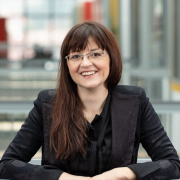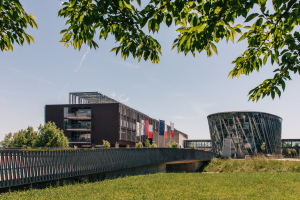
Špela Arhar Holdt
Dr
Researcher
arhar.spela(at)cjvt.si
The Centre for Language Resources and Techonologies at the University of Ljubljana
Center za jezikovne vire in tehnologije Univerze v Ljubljani
The Centre for language resources and technologies at the University of Ljubljana (CJVT UL) is a research unit that conducts scientific research. CJVT develops and maintains key digital language resources and technologies for contemporary Slovene. Their resources have practical value and are accessible to all Slovene language users around the world. The Centre constantly encourages open access to linguistic data and therefore ensures their databases are accessible under open licenses.
CJVT UL is an interdisciplinary centre connecting five faculties of the University of Ljubljana: the Faculty of Social Sciences, the Faculty of Arts, the Faculty of Education, the Faculty of Electrical Engineering, and the Faculty of Computer and Information Science. It is part of the Network of Research and Infrastructural Centres at the University of Ljubljana. This means it offers infrastructural support (tools, data, expertise) for the Slovene language.
In addition to this, CJVT UL focuses on scientific research and the development of a variety of modern resources that focus on its many end-users. For example, users can participate in the development of “responsive language resources” by adding their own dictionary/lexicon entries, voting on other user’s submissions and computer-generated content or by submitting their own pronunciation.
The main products can be found on their resources site and include:
- Gigafida, a reference corpus of written standard Slovene
- Sloleks, a Slovene morphological lexicon
- Sopomenke, a Thesaurus of Modern Slovene
- Kolokacije, a Collocations Dictionary of Modern Slovene
CJVT UL has been founded amidst concerns about the unfavourable state of the research on modern Slovene, and of language technologies and resources for Slovene. For this reason, the University of Ljubljana (where many study programmes and research programmes are taking place, and where many researchers in this field are based) took on the responsibility to improve the situation and form an institution that could ensure a systematic long-term development of technologies, resources and tools for Slovene enabling it to keep up with other languages in the digital world.





